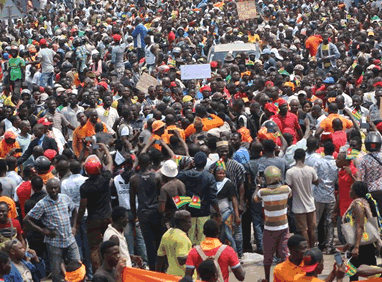The people rise against Togo’s political dynasty
 Togo is experiencing an unprecedented surge in political unrest. Thousands of people join street demonstrations organized by opposition leaders to call for democratic change in the country. Death, injury, tear gas, repression, nothing seems to prevent the demonstrators from gathering and calling for change.
Togo is experiencing an unprecedented surge in political unrest. Thousands of people join street demonstrations organized by opposition leaders to call for democratic change in the country. Death, injury, tear gas, repression, nothing seems to prevent the demonstrators from gathering and calling for change.
Since August 19, 2017, protesters in country have been demanding the restoration of the 1992 constitution which limited the number of presidential terms to two. In 2002, the constitution was amended to enable President Gnassingbé Eyadéma– the current president’s father – to run for a third five-year term. The current ruling government promised institutional reforms during the 2015 electoral campaign but failed to keep its promise. Togo and Cameroon are the only two countries in the west African region to have constitutions that allow unlimited presidential terms.
Following a bloody coup in April 1967, Gnassingbé Eyadéma came to power and ruled the country as a dictator for 38 years. He was Africa’s longest-serving leader at the time of his death in 2005. In April 2005, his son, Faure Gnassingbé won presidential elections which the opposition condemned as rigged. The election was followed by a deadly street violence between rival supporters. The UN later estimated that 400-500 people were killed. On 25 April 2015, Faure Gnassingbé was re-elected for a third five-year term.
Togo has two major ethnic groups. The northern part of the country is dominated by the Kabyé people, while the southern, coastal part of the country is dominated by the Ewé. Togo’s ethnic divide was strongly exploited for almost four decades by its previous dictator, Gnassingbé Eyadéma. With the help of former colonial master France, he made sure that his fellow Kabyé people (about 12 per cent of Togo’s population) dominated the upper ranks of the military, police and government – even though the Ewé are a much larger group (comprising about 40 per cent of Togo’s population). The longer Eyadéma was in power, the more conflicts he provoked between the two groups to stay in power.
Now, almost every week, thousands of people of both ethnic groups participate in the anti-Gnassingbé rally in the capital Lomé and in many other towns.
“There is an increasing pressure from the citizens to put an end to the endless ruling of the Gnassingbé family dynasty,” says Pedro Francis Amouzou, civil rights activist and spokesman of the “Collective Sauvons le Togo” (Let’s save Togo Collective).
Pressure from the protesters forced the government to introduce a draft bill on constitutional reforms in Parliament.
So far, four people have been killed during demonstrations led by the supporters of the opposition. Civil society organisations condemned the use of disproportionate force by the security forces against unarmed civilians.
Authorities seized the press card of TV5’s journalist Emmanuelle Sodji for “partial reporting of the crisis”. The Internet is shut down whenever there is a protest. Human rights activist Farida Nabourema claims that Togo is “at a turning point”.
By Ibrahim Oredola Falola in Lome, Togo
Email: [email protected]
